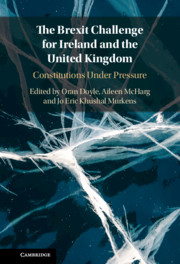Book contents
- The Brexit Challenge for Ireland and the United Kingdom
- The Brexit Challenge for Ireland and the United Kingdom
- Copyright page
- Contents
- Figures
- Tables
- Contributors
- Preface
- The Constitutional Tensions of Brexit
- Part I Territorial Pressures in Ireland and the United Kingdom
- Part II Institutional Pressures and Contested Legitimacy
- 8 Populism and Popular Sovereignty in the UK and Irish Constitutional Orders
- 9 Party, Democracy, and Representation
- 10 Westminster versus Whitehall: What the Brexit Debate Revealed About an Unresolved Conflict at the Heart of the British Constitution
- 11 Brexit and the Problem with Delegated Legislation
- 12 Litigating Brexit
- 13 The Law Officers: The Relationship between Executive Lawyers and Executive Power in Ireland and the United Kingdom
- 14 In Search of the Constitution
- Index
13 - The Law Officers: The Relationship between Executive Lawyers and Executive Power in Ireland and the United Kingdom
from Part II - Institutional Pressures and Contested Legitimacy
Published online by Cambridge University Press: 17 August 2021
- The Brexit Challenge for Ireland and the United Kingdom
- The Brexit Challenge for Ireland and the United Kingdom
- Copyright page
- Contents
- Figures
- Tables
- Contributors
- Preface
- The Constitutional Tensions of Brexit
- Part I Territorial Pressures in Ireland and the United Kingdom
- Part II Institutional Pressures and Contested Legitimacy
- 8 Populism and Popular Sovereignty in the UK and Irish Constitutional Orders
- 9 Party, Democracy, and Representation
- 10 Westminster versus Whitehall: What the Brexit Debate Revealed About an Unresolved Conflict at the Heart of the British Constitution
- 11 Brexit and the Problem with Delegated Legislation
- 12 Litigating Brexit
- 13 The Law Officers: The Relationship between Executive Lawyers and Executive Power in Ireland and the United Kingdom
- 14 In Search of the Constitution
- Index
Summary
The United Kingdom’s decision to invoke Article 50 of the Treaty on European Union triggered serious ripples across its constitutional order, including repeat clashes between Parliament and the Government. This friction reached a crescendo in 2018, following the former’s unprecedented decision to hold the latter in contempt for refusing to obey its request to publish the Attorney General’s full legal advice on the Government’s draft Withdrawal Agreement with the EU. One of the many interesting constitutional issues thrown into sharp focus by this event, was the important relationship between executive power and the legal advice-giving role of executive lawyers.
Using the UK and Ireland as illustrative examples, this essay considers how the work of executive lawyers interacts with executive authority. I argue that their legal advice can be important in supporting the executive’s political narratives about the basis for controversial policy action or inaction and is deployed by the executive to enhance its perceived legal credibility and political legitimacy. Its relationship to exercises of public power deserves greater positive and normative scrutiny, both in each system and from a comparative public law perspective more broadly.
Keywords
- Type
- Chapter
- Information
- The Brexit Challenge for Ireland and the United KingdomConstitutions Under Pressure, pp. 292 - 312Publisher: Cambridge University PressPrint publication year: 2021



